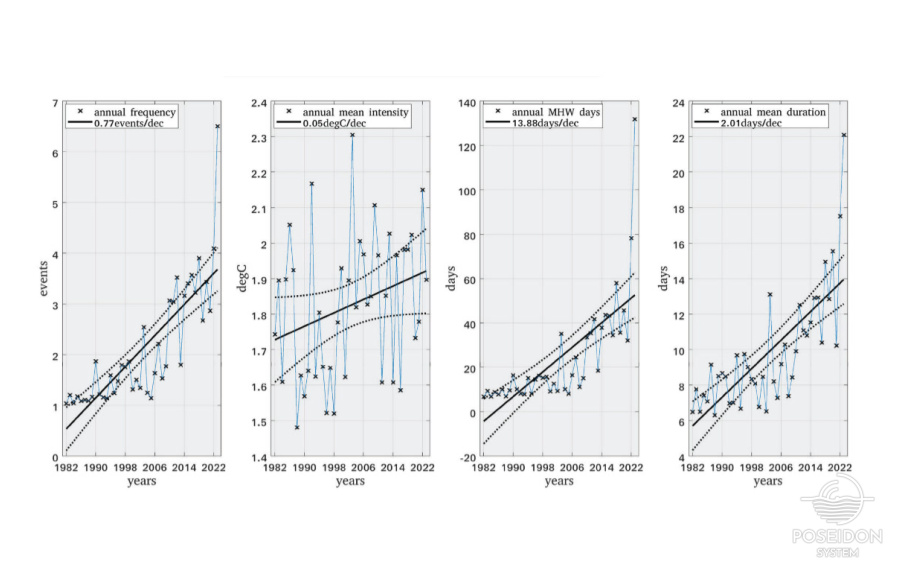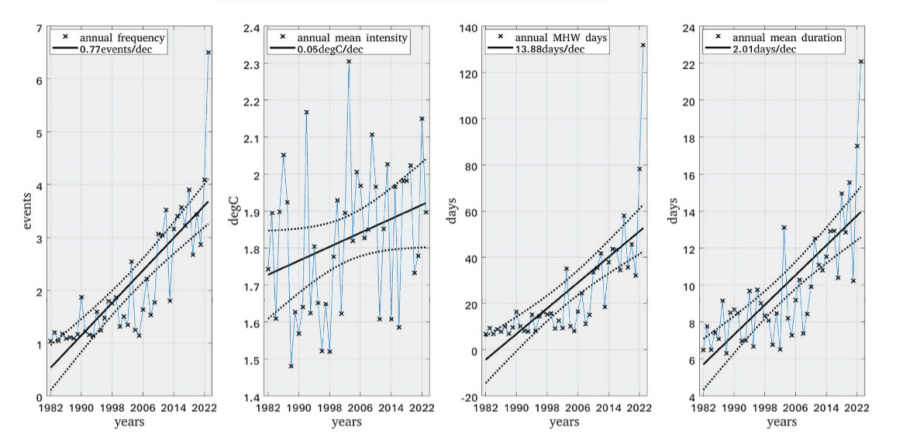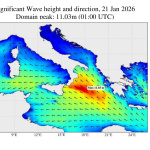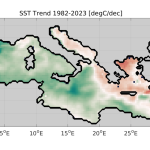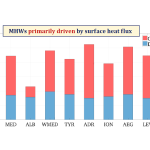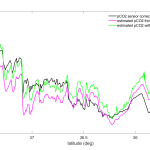New literature review on Mediterranean marine heatwaves
The Mediterranean Sea, an ocean basin already warming faster than the global ocean, is increasingly affected by marine heatwaves (MHWs) —periods of prolonged, exceptionally high sea temperatures. Amplified by climate change, these extreme events have become more frequent, intense, and longer-lasting, posing significant threats to marine ecosystems and coastal economies.
“Marine Heatwaves in the Mediterranean Sea: A Literature Review” by Darmaraki et al. (2024) is a newly published review in the journal Mediterranean Marine Science. This collaborative effort brings together scientists from multiple universities and institutions, including the POSEIDON team at HCMR, to offer a comprehensive synthesis of the physical, biological, and socio-economic dimensions of MHWs in the Mediterranean Sea. It reviews current knowledge on significant surface and subsurface events, their underlying drivers, future projections, and impacts on marine ecosystem functioning in the basin, while discussing future perspectives.
Trends and notable events
MHWs have steadily intensified since the 1980s, by means of multiple properties commonly used to describe MHW conditions (see figure below). Notable events, such as those in 2003 and 2022, have been associated with very high temperature anomalies relative to climatology and very long duration, respectively. Importantly, warm extremes generated at the sea surface extend beyond surface waters, with subsurface events often lasting longer, posing significant challenges to marine ecosystems.
Annual MHW metrics in the Mediterranean Sea (1982–2023): (a) MHW frequency, (b) mean MHW intensity, (c) total number of MHW days and (d) MHW duration. Linear trend and confidence intervals (95th confidence level) are given in black solid and dashed lines, respectively. Events are detected using the Hobday et al. (2016) methodology and the satellite SST dataset: Mediterranean Sea High Resolution L4 Sea Surface Temperature Reprocessed (https://doi.org/10.48670/moi-00173). Source: Darmaraki et al. (2024).
Impacts on marine life and coastal economies
MHWs have far-reaching biological impacts, causing large-scale mortality events for key species including corals, sponges, and seagrasses. The review offers detailed information on how specific species have been affected by MHWs in the Mediterranean Sea. Socio-economically, MHWs have disrupted fisheries and aquaculture and created challenges for coastal communities reliant on marine ecosystems. The cascading effects highlight the urgent need for addressing these events from both ecological and socio-economic perspectives.
Future avenues and the role of Artificial Intelligence
The review also emphasizes the need for improved monitoring, forecasting and understanding of MHWs, and discusses limitations and perspectives regarding existing and developing research methodologies within this relatively fresh yet surprisingly expanding research field. The use of advanced tools such as artificial intelligence (AI) appears to be a promising approach —although still at its early stages— for identifying patterns in MHW activity and drivers, and especially for improving predictive capabilities, ultimately helping to mitigate impacts of MHWs.
A Comprehensive resource for the Mediterranean Sea
The review synthesizes research relevant to all MHW-related aspects, covering physical drivers, past variability, significant events, and ecological and socio-economic implications of MHWs in the Mediterranean basin. By identifying knowledge gaps and synthesizing perspectives for future research, it is intended to serve as a valuable resource for scientists, policymakers and stakeholders working to protect marine ecosystems and coastal economies in a rapidly warming Mediterranean Sea.
Access the publication here!
Darmaraki, S., Denaxa, D., Theodorou, I., Livanou, E., Rigatou, D., Raitsos, E. D., Stavrakidis-Zachou, O., Dimarchopoulou, D., Bonino, G., McAdam, R., Organelli, E., Pitsouni, A., and Parassyris, A.: Marine Heatwaves in the Mediterranean Sea: A Literature Review, Mediterr. Mar. Sci., 25, 586–620, https://doi.org/10.12681/mms.38392, 2024.



